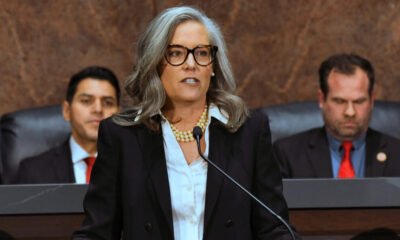analysis
Voters Speak, But Parties Reign in Presidential Nominee Selection

The Democratic Party has nominated Kamala Harris as its 2024 presidential candidate, despite primary voters choosing an alternative in the preceding primaries. Can the party bypass the primary results?
Yes, they can. Presidential primaries are not as definitive as they appear. When President Joe Biden announced he would not seek reelection shortly before the convention, it forced a reevaluation of how parties nominate presidential candidates.
Historically, parties have significant control over the nomination process, which can seem surprising to those who view primaries as straightforward electoral exercises. According to Alexander Keyssar, a Harvard professor, primary outcomes are often perceived as more binding than they truly are.
This year, the Democratic primaries were relatively uncompetitive. As an incumbent, Biden faced minimal opposition and won easily. However, voters in primary elections actually vote for a slate of delegates committed to a candidate rather than directly for the candidate themselves. These delegates then cast their votes at the convention to officially select the nominee.
In theory, delegates have significant power. They can change the nomination rules if a majority agrees, although that might not be considered good politics. Biden’s withdrawal created a rare situation reminiscent of the chaotic 1968 Democratic convention, which ultimately led to modernizing the primary system.
Before 1968, primary participation varied, and party leaders had significant sway in candidate selection. After President Lyndon B. Johnson chose not to run and the assassination of Robert F. Kennedy, Hubert Humphrey was nominated despite not competing in any primaries, leading to Richard Nixon’s victory.
The resulting backlash led to the formation of the McGovern-Fraser Commission, which introduced reforms to shift nomination power from party insiders to ordinary voters. This change was monumental, fundamentally altering the nomination process to what it is today.
Later, superdelegates were introduced as a balance to this system, allowing experienced party officials a role. However, their influence has been contentious, notably in the 2008 and 2016 primaries. For example, potential superdelegate influence in the 2008 primary caused significant controversy and eventual shifts in superdelegate votes.
In the current scenario, Biden’s endorsement of Harris influenced delegates to support her. This reflects the complex interplay of party dynamics and voter influence within the nominating process.
Alterations to this system now seem unlikely. As Byron Shafer pointed out, once primaries are established, they become difficult to retract because they give a sense of empowerment to the voters.
This article was originally published by Votebeat, a nonprofit news organization covering local election administration and voting access.


















